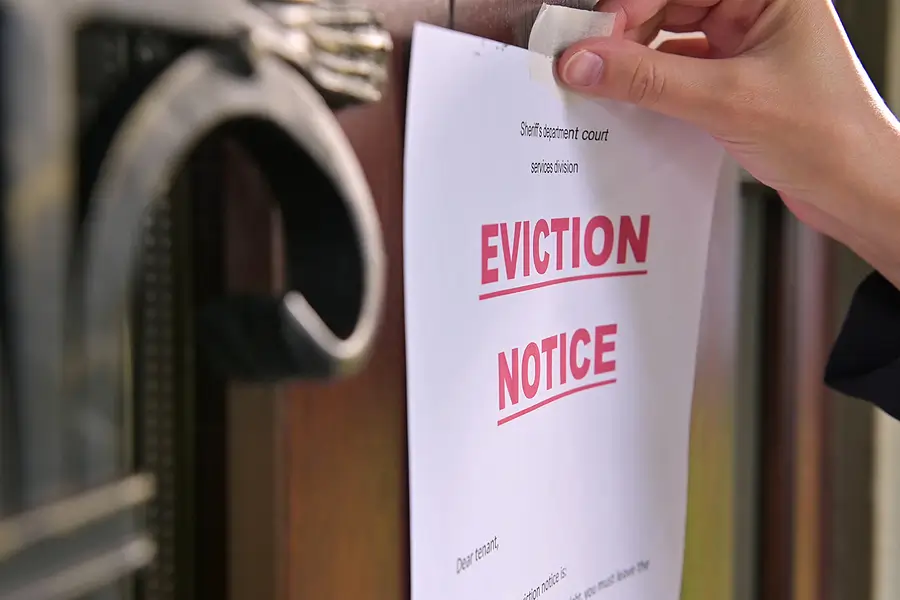As an Arizona residential landlord, dealing with tenants who don’t follow the rules can be stressful. When a tenant pays late consistently, stops paying rent altogether, causes damage, or violates the lease agreement, you may need to start the eviction process.
While it’s never an easy situation, knowing the steps to take will help you manage the process smoothly and stay in line with the Arizona Landlord-Tenant Act.
This article will walk you through each step of the eviction process in Phoenix, from giving proper notice to securing a writ of restitution, and help ensure you follow all legal requirements along the way.
Steps to Handle Evictions as a Phoenix Landlord
The eviction process can feel overwhelming, but by following these steps, you can handle the situation legally and efficiently. Here’s what you need to do when a tenant violates the lease and you need to take action.
Step 1: Review the Lease Agreement
Before doing anything, check the lease or rental agreement. This legal document outlines the rules for both you and the tenant, such as when rent is due, whether pets are allowed, and who is responsible for maintenance.
If your tenant isn’t following the agreement, such as by keeping unauthorized pets or failing to address unpaid rent, it’s essential to have clear evidence. This documentation can help if you need to go to court later.
Step 2: Give the Tenant Proper Notice
In Arizona, you can’t start eviction proceedings without giving the tenant proper notice. The type of eviction notice you send will depend on what the tenant did wrong:
- A 5-day notice is for non-payment of rent.
- A 10-day notice is for lease violations, such as having unauthorized pets or causing excessive property damage.
- An immediate notice is for serious violations, like criminal activity.
Make sure you send the notice via certified mail or deliver it with a certified process server.
Following this step is crucial to ensure everything is legally valid and the process moves forward without delays.
Step 3: File an Eviction Complaint with the Court
If the notice period has passed and the tenant hasn’t moved out, it’s time to take the next step and file an eviction complaint with your local justice court. This is when the official eviction process begins.
When filing, be sure to include essential documents such as a copy of the rental agreement, proof that you sent the written notice, and the residential eviction information sheet. Additionally, don’t forget to pay the filing fees and court costs.
Once you’ve filed, the court will schedule a court date and promptly notify the tenant. This is a critical step to ensure you are legally proceeding with the eviction and following all necessary legal requirements.
Step 4: Attend the Court Hearing
At the court hearing, both you and the tenant will present your cases. The tenant may offer a legal defense, such as claiming they should have been allowed to withhold rent because of maintenance issues or violations of building codes.
If the judge rules in your favor, you’ll receive an eviction judgment, which may include:
- Compensation for any unpaid rent.
- Attorney fees and court costs.
- Permission to remove the tenant’s belongings from the rental property.
Step 5: Enforce the Eviction with a Writ of Restitution
If the tenant doesn’t leave after the court judgment, you can request a writ of restitution from the court. This legal order gives the sheriff the authority to remove the tenant from the rental unit.
Remember, only the sheriff can physically remove the tenant. You cannot take matters into your own hands.
Step 6: Handle the Tenant’s Personal Belongings
If the tenant leaves behind belongings after being evicted, you must follow Arizona’s rules on abandoned property. Store the tenant’s belongings for 14 days, and send a written notice via certified mail to inform them.
Be careful, as failing to handle their property correctly could lead to the tenant suing you for twice the actual damages. To avoid trouble, make sure to follow the law on security deposits and personal property.
Avoid These Common Mistakes During Evictions
When dealing with an eviction, it’s easy to make mistakes. Here are some common errors to avoid:
- Not providing the correct tenant notice.
- Skipping the residential eviction information sheet.
- Trying to evict a tenant without a writ of restitution.
- Failing to hire a certified process server.
- Not following Arizona law regarding tenant rights or notice delivery.
These mistakes could delay the process or cause the case to be thrown out. Be sure to follow every step carefully.
When to Hire a Property Manager
Evictions can be stressful and confusing, but a reliable property manager can take care of it all for you. From sending notices and handling the paperwork to attending court hearings and working with the sheriff, they’ll guide you through every step of the eviction process.
A good property manager can also help you avoid the need for evictions in the first place. They screen tenants carefully using strong rental applications, make sure the lease terms are clear and easy to follow, and quickly notify tenants if any issues come up.
Plus, they keep your rental unit in line with Arizona department standards. Working with a property manager means you can focus on growing your investment while they take care of the details.
Ensuring a Stress-Free Eviction Process in Phoenix
Understanding how to handle evictions as a Phoenix landlord is essential to protecting your investment. From reviewing your lease agreement to getting a writ of restitution, each step ensures that you stay within the law and keep your rental property secure.
Evictions aren’t easy, but with the right information or the support of a trusted property management expert, you can manage the process efficiently and confidently.
Looking for expert help with your Phoenix rental?
At Ultimate Properties, we’ve been helping landlords like you handle evictions, protect their investments, and maintain steady rental income for over 35 years.
Let us take the stress off your plate. Contact us today for a comprehensive rental analysis and discover how our dependable team can help you manage your property with confidence.
FAQ
1. What happens if the tenant doesn't show up for the eviction hearing?
If the tenant fails to show up for the court hearing, the judge will typically rule in favor of the landlord, provided all necessary paperwork and notices have been properly filed. In such cases, the landlord will receive an eviction judgment and can proceed with a writ of restitution to remove the tenant.
2. Can a landlord evict a tenant without a formal court hearing?
No, Arizona law requires that landlords go through the formal court process for eviction. Even if a tenant violates the lease agreement or stops paying rent, you must file an eviction complaint with the justice court and attend a court hearing before you can remove the tenant from the rental unit.
3. How long does the entire eviction process take in Phoenix?
The eviction process in Phoenix can take anywhere from a few weeks to a couple of months, depending on factors such as the notice period, whether the tenant contests the eviction complaint, and the court’s schedule. Typically, the entire process, from the first notice to the writ of restitution, can take around 30-60 days if there are no significant delays.


